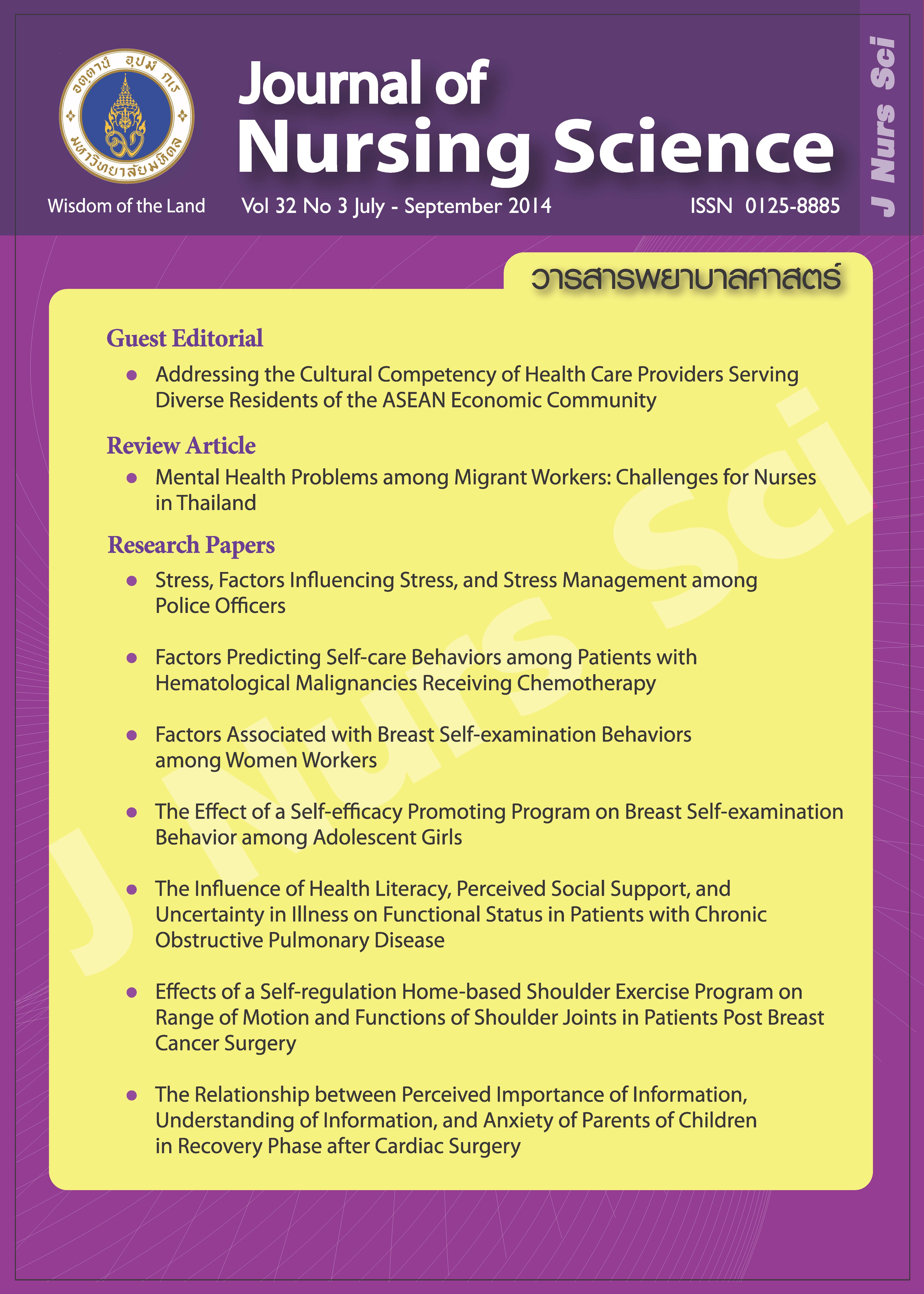Stress, Factors Influencing Stress, and Stress Management among Police Officers
Main Article Content
Abstract
Purpose: The purpose of this research was to examine stress, factors influencing stress and stress management in police officers.
Design: A correlational predictive study design.
Methods: Participants consisted of 82 policemen in two metropolitan police stations, Bangkoknoi District, Bangkok. The research instruments included a set of questionnaires of demographics, self-stress test, factors influencing stress, and stress management. Data were analyzed using descriptive statistics, correlation, and multiple regressions.
Main findings: Approximately one-fourth (25.6%) of the study sample reported higher stress than normal. Within this group, 3.7 % of the police officers reported highest stress. Organization and income factors were significantly predicted stress (β = .37, p < .01 and β = .28, p < .05, respectively). Income, characteristics of an occupation, organization, support from commander, and support from colleague/controlee factors could explain 28 % of the variance (R2 = .28, F = 5.94, p < .01) in stress of police officers. Additionally, 25.6 % and 20.7% of the police officers reported that talking about their problems with close friends or family members was the effective ways for reducing stress, followed by exercise, respectively.
Conclusion and recommendations: Factors significantly influencing stress were organization, and income. Superiors or executives should consider the human resources policy and management in organization. Moreover, promoting exercise and following principle of sufficiency economy to reduce expenses can reduce stress and improve personal health in police officers.
Keywords: factors influencing stress, police officers, stress, stress management
ความเครียด ปัจจัยที่มีอิทธิพลต่อความเครียด และการจัดการความเครียดของตำรวจ
บทคัดย่อ
วัตถุประสงค์: เพื่อศึกษาความเครียด ปัจจัยที่ทำให้เกิดความเครียด และการจัดการความเครียดในตำรวจ
รูปแบบการวิจัย: การวิจัยศึกษาความสัมพันธ์เชิงทำนาย
วิธีดำเนินการวิจัย: กลุ่มตัวอย่างเป็นเจ้าหน้าที่ตำรวจ จากสถานีตำรวจนครบาล 2 แห่ง ในเขตบางกอกน้อยจำนวน 82 นาย เครื่องมือการวิจัยประกอบด้วยชุดของแบบสอบถามในเรื่องข้อมูลส่วนบุคคล การประเมินความเครียดด้วยตนเอง ปัจจัยที่ทำให้เกิดความเครียดในสถานที่ทำงาน และการจัดการกับความเครียด เก็บรวบรวมข้อมูลโดยให้กลุ่มตัวอย่างตอบแบบสอบถามด้วยตนเอง วิเคราะห์ข้อมูลโดยใช้สถิติเชิงพรรณนา วิเคราะห์ความสัมพันธ์ และถดถอยพหุคูณ
ผลการวิจัย: หนึ่งในสี่ของกลุ่มตัวอย่าง (ร้อยละ 25.6) มีระดับความเครียดสูงกว่าปกติ ซึ่งในจำนวนนี้มีความเครียดสูงกว่าปกติมากร้อยละ 3.7 ปัจจัยท่มี ีอิทธิพลต่อความเครียดของตำรวจนครบาลคือ ปัจจัยด้านองค์กร (β = .37, p < .01) และด้านรายได้ (β = .28, p < .05) ปัจจัยด้านรายได้ ด้านการปฏิบัติงาน ด้านองค์กร ด้านการสนับสนุนจากผู้บังคับบัญชา และด้านการสนับสนุนจากผู้ร่วมงาน/ผู้ใต้บังคับบัญชา สามารถร่วมอธิบายความเครียดของตำรวจนครบาลได้ร้อยละ 28 (R2 = .28, F = 5.94, p < .01) การจัดการความเครียดที่มีประสิทธิภาพ ได้แก่ วิธีการพูดคุยระบายกับคนที่สนิทหรือคนในครอบครัว (ร้อยละ 25.6) รองลงมาคือออกกำลังกาย (ร้อยละ 20.7)
สรุปและข้อเสนอแนะ: ปัจจัยที่มีอิทธิพลต่อความเครียดในการทำงานอย่างมีนัยสำคัญ ได้แก่ ปัจจัยด้านองค์กร รองลงมาคือ ด้านรายได้ ผู้บังคับบัญชาหรือผู้บริหารควรพิจารณาเรื่องนโยบายด้านทรัพยากรบุคคลขององค์กร และการบริหารจัดการในองค์กร รวมทั้งสนับสนุนการออกกำลังกาย และสนับสนุนให้นำหลักเศรษฐกิจพอเพียงมาใช้เพื่อลดค่าใช้จ่าย จะช่วยให้ตำรวจมีความเครียดในการทำงานลดลง และมีสุขภาพดีขึ้นได้
คำสำคัญ: ปัจจัยที่ทำให้เกิดความเครียด ตำรวจ ความเครียด การจัดการความเครียด
Article Details
Copyright Notice: Nursing Science Journal of Thailand has exclusive rights to publish and distribute the manuscript and all contents therein. Without the journal’s permission, the dissemination of the manuscript in another journal or online, and the reproduction of the manuscript for non-educational purpose are prohibited.

Disclaimer: The opinion expressed and figures provided in this journal, NSJT, are the sole responsibility of the authors. The editorial board bears no responsibility in this regard.


